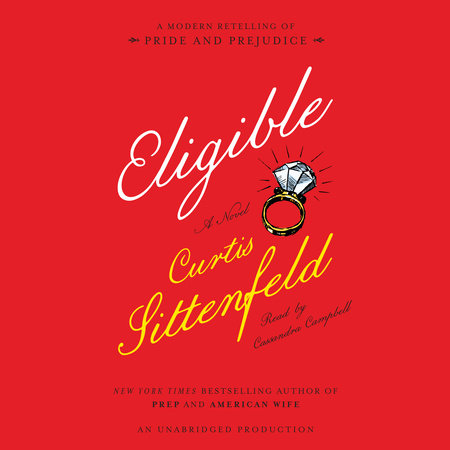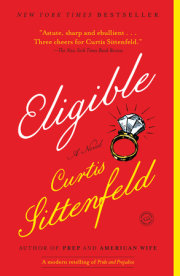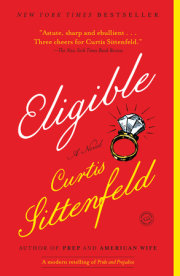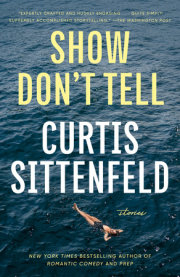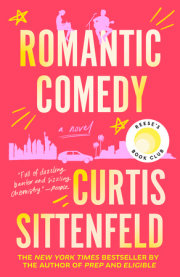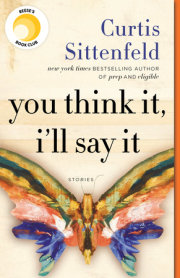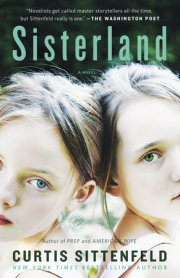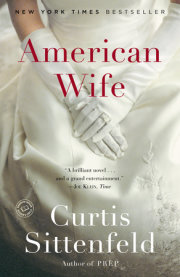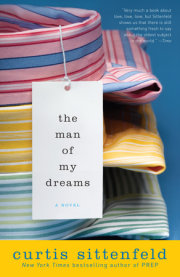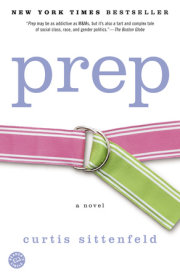Chapter 11
“YOUR MOTHER HAS shared a tragic piece of news about Cousin Willie with me,” Mr. Bennet said when the family was assembled for dinner. “He’s coming to visit.”
“Really, Fred,” Mrs. Bennet said, and Jane said, “Dad, that’s an awful way to set us up.”
Mr. Bennet smiled as if he’d been doubly complimented. “As you all know, my sister is flying out next week, to check if I still have a pulse and, in the event that I don’t, to take possession of our mother’s silver. For reasons that elude me, her stepson has decided to accompany her.” Liz swallowed a spoonful of the gazpacho Jane had prepared and said, “I know you all find this hard to believe, but Cousin Willie is kind of a big deal.”
“And if I were an insomniac,” Mr. Bennet replied, “I’d like nothing better than to hear him explain why.”
“Maybe he can tell us why the Internet in this house is so slow,” Kitty said.
“Or teach Mom to use her cellphone,” Lydia suggested.
“His start-ups have made millions of dollars,” Liz said, and Mr. Bennet said, “Yet he doesn’t know how to put on a pair of trousers.”
“That was 1986,” Jane said.
Which indeed it had been—the summer before Liz had started sixth grade, the Bennets had made a trip to California to visit Mr. Ben- net’s sister, Margo, and to meet the man to whom she had just become engaged, a widower with a three-year-old son. Someone (Mr. and Mrs. Bennet each vehemently denied responsibility) had decided it would be a lark to make the journey by car. Thus the Bennet family had set out from Cincinnati in their minivan, driving roughly five hundred miles a day for five days in a row; at the time, Jane was twelve, Liz eleven, Mary three, Kitty in utero, and Lydia not yet conceived. In Liz’s memory, the trip was a blur of rolling hills becoming flattened prairies, flattened prairies becoming sprawling ranchlands, and ranchlands becoming scrubby desert. In Utah, a detour to see the red rock region had been scuttled due to increasing familial tensions; the mini-van’s backseats had become a mayhem of hair-pulling, girl farts, and toddler squalls that distracted Liz from her powerful wish to reach the end of the tawdry romance she was reading in which a brooding Cheyenne loner inserted his fingers into the most private cavity of a young British heiress while they rode upon the same horse. Liz’s utter thrall to Colt and Jocelyn’s story compelled her to ignore a building nausea that eventually asserted itself with her crying out, “I’m going to be sick!” and vomiting an Egg McMuffin, hash browns, and ketchup onto Mary fifty miles northeast of Sacramento. Liz did sometimes wonder if their relationship had ever properly recovered, and insofar as it hadn’t, she couldn’t blame her sister.
By the time the Bennets pulled into the driveway of the home be- longing to Aunt Margo’s new fiancé in Sausalito, the minivan was strewn with food wrappers and socks and discarded Mad Libs books, not only reeking of vomit but also making an unaccountable scraping noise on the rear right side of the undercarriage; the Bennets’ antipathy for one another was of such an intimate variety it was almost like affection. They spilled out of the car and walked up the brick path of a well-tended bungalow, but before they could ring the bell, the front door opened and a small red-haired boy stood before them completely naked. “Dad!” the boy yelled. “They’re here!” His limbs were alabaster, his penis minuscule and, particularly to Mary, bewildering. “Look away, girls!” Mrs. Bennet cried, prompting in Liz and Jane a fit of giggles. This was Cousin Willie and also, obviously, Cousin Willie’s willy.
Over the years, the Bennets and the Collinses saw one another in- termittently, and at some point it became apparent that Cousin Willie was a bit of a technology savant. He taught himself to code at thirteen, began advising local businesses on how to bolster their Web presences at fifteen, and dropped out of UCLA during his sophomore year, after selling a company that had developed a proprietary format for transmitting data between servers and Web applications—which was to say, a company no Bennet understood whatsoever—for a rumored $20 million. Now a man of thirty, Willie was running his third or fourth software development start-up. And yet all of the Bennets except Liz and her mother refused to see him as anything other than a naked three-year-old. Mrs. Bennet was clearly intrigued by his money and had once asked Liz a series of probing questions about how he’d received the payment for his first company, questions to which Liz didn’t know the answers. And Liz herself had some years back run into Willie at a technology conference in Las Vegas that she was attending as a journalist and had shared a surprisingly pleasant lunch with him; although the conversation had essentially been a monologue on his part, it had been an interesting monologue, and he was the person who had first told her about Twitter.
At the dinner table, Mrs. Bennet said, “Jane, I imagine you’ll be busy with Chip Bingley, but Liz can entertain Willie when he’s here.”
“Why will Jane be busy with Chip Bingley?” Kitty asked.
With relish, Mrs. Bennet said, “They’re having dinner tomorrow night at Orchids.”
Uncertainly, Jane said, “Mom, you haven’t been reading my texts, have you?”
Merrily, Lydia said, “She doesn’t know how!” Mrs. Bennet appeared uncontrite. “Helen Lucas mentioned it.” Jane furrowed her eyebrows, which for her reflected genuine pique.
“How would Mrs. Lucas know?”
Liz cleared her throat. “I think I told Charlotte. But just in passing.”
“Chip and I might never see each other again after Saturday.” Jane’s cheeks were flushed. “So please, can everyone not make a big deal out of this? Mom, I’ll have plenty of time to spend with Cousin Willie.”
“It was obvious that Chip found you absolutely charming, Jane,” Mrs. Bennet said. “And so he should have. But you’ll have to ask why he didn’t go into private practice. Working in an emergency room, he must see very unattractive people.”
Liz, who felt some responsibility for displeasing her sister, said, “I wonder if Willie is interested in visiting the Freedom Center.”
“Just so you all know, I have a paper due at the end of next week,” Mary said. “I won’t have much time for Willie or Aunt Margo.”
“That’s so heartbreaking,” Lydia said. “I wonder if they’ll ever re- cover from the devastation.”
“Well, I look forward to seeing both of them,” Jane said.
From the head of the table, Mr. Bennet said, “That makes one of us.”
From the book ELIGIBLE by Curtis Sittenfeld. Copyright © 2016 by Curtis Sittenfeld. Reprinted by arrangement with Random House, an imprint of Random House, a division of Penguin Random House LLC. All rights reserved.
Copyright © 2016 by Curtis Sittenfeld. All rights reserved. No part of this excerpt may be reproduced or reprinted without permission in writing from the publisher.

